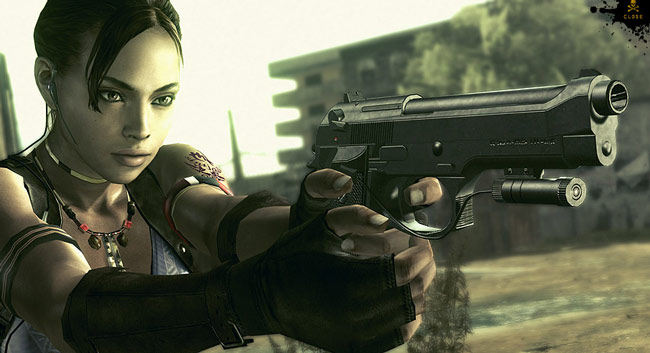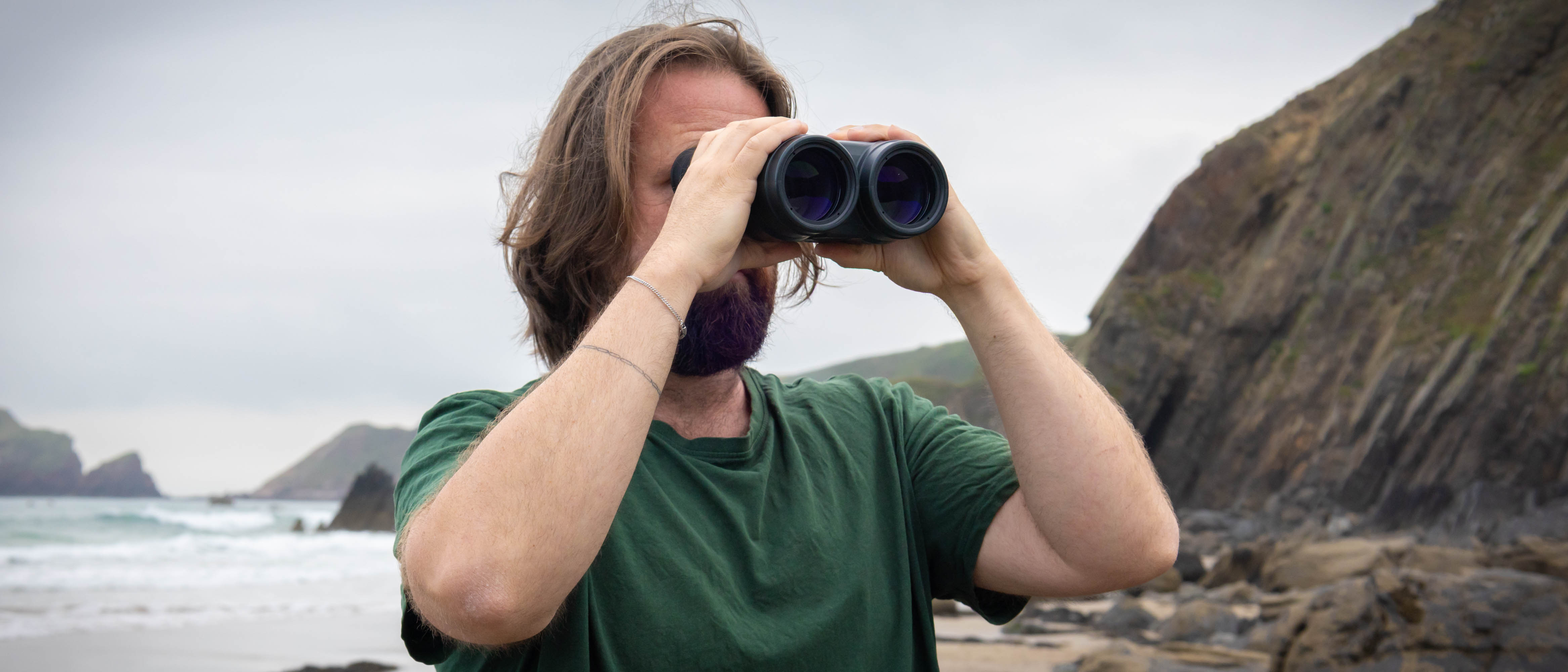For Better or Worse, 'Resident Evil 5' Exposes Racism

Video gamers hardly blink at virtual violence — but charges of racism can raise eyebrows. For instance, anticipation for the fan-favorite "Resident Evil" series turned to uncertainty for some journalists in 2007, when they saw a game trailer which featured a white protagonist battling crowds of enraged Africans in a Third-World setting.
Now cultural and media experts have weighed in as "Resident Evil 5," the game previewed in the trailer two years ago, rolls out on U.S. shelves this Friday. And their opinion suggests that video game players should not worry so much.
In fact, the survival horror game may actually focus needed attention on issues of race and how the United States and other industrialized nations view the developing world.
Controversy strikes
The best-selling "Resident Evil" games tell an ongoing story about the sinister Umbrella Corporation and its biological experiments, which typically result in plenty of infected, zombie-like enemies for players to fight. Racism never came up as an issue in past "Resident Evil" game settings, which have included a fictional Midwestern U.S. town and locations in Spain.
That changed with the debut of a first "Resident Evil 5" trailer in the summer of 2007.
"Wow, clearly no one black worked on this game," said N'Gai Croal, a recently retired Newsweek game editor, when he spoke with MTV Multiplayer Blog about black professionals in the game industry.
Get the world’s most fascinating discoveries delivered straight to your inbox.
Croal suggested that many images in the trailer "dovetailed with classic racist imagery," saying that all the Africans appeared distant and hostile to the white character even before they turned into infected zombies. He added that the trailer's vaguely Middle Eastern-sounding music was reminiscent of the movie "Black Hawk Down," which drew some criticism in 2001 for its one-sided portrayal of U.S. Special Forces taking on hundreds of Somali fighters.
An MTV Multiplayer Blog editor, Stephen Totilo, also expressed his misgivings and contrasted the trailer's depictions of scary-looking Africans with his own fond recollections of people he met in Tanzania.
"It looks like it's an advertisement to virtually shoot poor people," Totilo noted. He said that he hoped to see more of the game before passing judgment, but clearly stated his uneasiness with seeing "the global sign of poverty down the barrel of a gun," as he put it.
The trailer led to a fierce debate among players and journalists, with many gamers angered or worried about the idea that a favorite game could be accused of racism.
Not just black and white
A more complex picture of "Resident Evil" became clear as Capcom, the Japanese company behind "Resident Evil 5," revealed additional information along with a second game trailer in May 2008. "Resident Evil" developers also expressed their surprise about the controversy in an interview with MTV Multiplayer Blog, and said that they expected the uproar to die down once the game hit shelves.
{{ video="LS_090312_Latest_trailer" title="'Resident Evil 5' Story Trailer" caption="A trailer for the game “Resident Evil 5” which hints at a more complex story that goes beyond white and black." }}
The main American character, Chris Redfield, turns out to have a half-white, half-black female partner named Sheva Alomar. Two players can cooperate in the game by controlling both characters.
A black soldier named Josh Stone also shows up in the game to help players, as part of a fictional bioterrorism response unit.
Enemies in the game appear to be similarly diverse. White characters are among the infected and zombie-like enemies, and the true villains of the story include multinational corporations and longstanding "Resident Evil" villain Albert Wesker — a white male.
But even recent hands-on previews of "Resident Evil 5" have not halted the stream of criticism. One preview for the Web site Kikizo mentioned a supposed scene in the game where infected black villagers drag off a white woman, comparing it to the "classic racist trope" of brutal black males attacking or corrupting white women.
The same site then asked the British Board of Film Classification to look at the scene. Sue Clark, head of communications for the British film and media ratings board, said that the worries were unfounded. The scene described by Kikizo actually contained just one non-black character dragging the blonde woman away.
"As I said yesterday, we do take racism very seriously, but in this case there is no issue around racism," Clark said in a written statement to Kikizo.
Entering the fray
An editor for VideoGamer.com recently showed a preview of "Resident Evil 5" to Glenn Bowman, an anthropologist with the University of Kent at Canterbury in the UK.
"I was effectively put through the stages without having to be blown away or eaten by zombies," Bowman told LiveScience.
A video game hardly compares with Bowman's real-life research, which has taken him to war zones such as Jerusalem and the surrounding region before, during and after the first Palestinian Intifada against Israeli rule. Bowman also worked in the Balkans during a series of conflicts among Slovenians, Croatians, Serbians and Bosnians. But he brought his view of those conflicts among different ethnic groups to his take on "Resident Evil."
"It's quite possible that the game makers were leaving things open," Bowman pointed out. He said that the game is "not explicitly racist," but instead takes a more ambivalent approach by playing with themes that can be read as both racist and anti-racist.
He mentioned how Capcom may provide a unique third-party perspective from Japan, a nation that has represented both the colonized and colonizers during its history. That could allow Japanese game developers to tackle topics and issues which Western developers approach with more hesitation.
Bowman saw one disturbing scene in the preview provided by VideoGamer.com, where a group of uninfected but hostile African villagers are beating a sack-like object — something that plays off of pop culture representations of "savage" cultures.
On the other hand, the game's theme of multinational corporations exploiting poor black villagers struck Bowman as a "strong statement about colonial exploitation." It also reminded him of cases where scientists conducted medical experiments on blacks and other minorities, as well as the issue of pharmaceutical companies conducting drug testing in Africa.
"To some degree, what 'Resident Evil 5' did was try to bring some of that nuance in," Bowman said. "The real villains in the game are clearly white scientists, and that begins to bring up that it's not primitive blacks against good whites."
Pulling the covers off
"Resident Evil 5" represents just the latest pop culture moment to bring up issues of race and racism. It comes during a time when President Obama, son of a black father and white mother, has encouraged a reexamination of race and identity — even as he starts going gray at the temples.
People also talked about race issues when Robert Downey Jr. donned blackface in last year's film "Tropic Thunder." And a recent book, "Blonde Roots," has caused some stir by telling the story of a white girl made into a slave by a dominant black culture, as part of an alternate history scenario.
Bowman suggested that identity, racial or otherwise, will only form when people face off against other groups. And that leaves "Resident Evil" players with perhaps deeper questions than they were expecting.
"I think that 'Resident Evil 5' is representing that in a pop culture format, by being politically incorrect enough to have a white American shooting black Africans," Bowman said. "This is like what happens all the time in real life, in Africa, in Indo-China, in the Middle East, but it's not something people feel comfortable with being shown in popular culture."
Bowman added that "Resident Evil 5" challenges the "cult of political correctness" by putting uncomfortable issues in front of players. And that could force people to think about their actual responses in such situations and perhaps recognize their own racial biases, he said.
"I have a real thing against political correctness because that means people don't say what they think and expose themselves to criticism and debate," Bowman said. He explained that a dominant political correctness has driven racist or other problematic views underground, allowing them to continue unchallenged.
"Now they're all under the covers," Bowman added. "I think what 'Resident Evil 5' did which was interesting was to pull the covers away."
- New Video - Controversial 'Resident Evil 5' Trailer
- New Video - 'Resident Evil 5' Action Trailer
- New Video - 'Resident Evil 5' Story Trailer
 Live Science Plus
Live Science Plus






